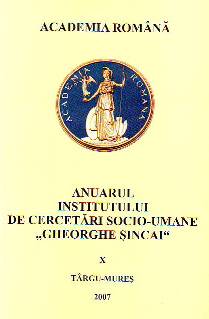Turneul diplomatic al lui Grigore Gafencu din 1939 şi relaţiile româno-bulgare
Grigore Gafencu’s diplomatic tour in 1939 and Romanian-Bulgarian relations
Author(s): Maria CosteaSubject(s): History
Published by: Institutul de Cercetări Socio-Umane Gheorghe Şincai al Academiei Române
Keywords: diplomatic tour; Grigore Gafencu; international relations; the Great Powers; Romania; Bulgaria; Southern Dobroudja
Summary/Abstract: In the spring of 1939, Romanian Foreign Minister, Grigore Gafencu, made a diplomatic tour in the European countries: Turkey, Poland, Germany, Belgium, Great Britain, France, Italy, Yugoslavia, Greece. Gafencu discussed with the European leaders the major problems of international relations, including the problem of Romanian-Bulgarian relationship. The relations between Romania and Bulgaria in 1938-1940 were marked by Bulgarian revisionism, especially by Bulgarian territorial claims against Romania. Bulgarian territorial claims became more aggressive after Germany and Hungary annexed territories from Czechoslovakia, threatening Romania. Sofia’s government diplomatic action pursued the “peaceful restitution of Southern Dobroudja to Bulgaria”. How? Not by War, but by pressings of the Great Powers on Romania. Indeed, all the Great Powers, Germany and Italy, USSR, USA, Great Britain, but also Hungary, Turkey and Yugoslavia supported Bulgarian claims on Southern Dobroudja, a fact underlined by Bulgarian historiography. Why? Hitler and Mussolini were interested in maintaining their alliance with Bulgaria. France and Great Britain, Turkey and Yugoslavia wanted to attract Bulgaria towards them and towards the Balkan Entante, by paying the price: Southern Dobroudja taken from Romania. USSR and Hungary had territorial claims against Romania. Stalin, Hitler and Mussolini competed for attracting Sofia as an allied. They all decisively supported Bulgaria to get Southern Dobroudja. Finally, on 31 July 1940, Hitler dictated to Romania to give up Southern Dobroudja. Romania obeyed and signed the treaty of Craiova on 7 September 1940, according to which Southern Dobrudja passed as a part of Bulgaria. “După încheierea Acordului economic româno-german din 23 martie 1939 si după primirea garanŃiilor anglo-franceze din 13 aprilie 1939, Grigore Gafencu a efectuat un important turneu diplomatic în Europa. Mai întâi, Gafencu a întreprins o vizită la Ankara în perioada 8-9 aprilie, unde a căzut de acord cu Saracioglu asupra solidaritătii româno-turce în cadrul politicii de garantii anglo-franceze. Turcia permitea trecerea prin Strâmtori a unui eventual ajutor militar anglo-francez pentru România. Întelegerea Balcanică trebuia menŃinută si întărită1. În timp ce trecea prin Polonia la 17 aprilie, el s-a întâlnit cu Iosif Beck. Apoi, în 18-20 aprilie, a efectuat o vizită la Berlin, având convorbiri cu Hitler, Ribbentrop si Göring. Gafencu le-a prezentat liderilor nazisti dorinta României de a rămâne în afara conflictului dintre Marile Puteri, de menŃinere a păcii si a statu-quo-ului teritorial în sud-estul Europei. Hitler i-a dat asigurări că nu sprijină revizionismul Ungariei „atâta timp cât poate conta pe prietenia României”. Hitler a promis satisfacerea cererilor românesti privind cumpărarea de armament din Germania.”[…]
Journal: Anuarul Institutului de Cercetări Socio-Umane »Gheorghe Şincai« al Academiei Române
- Issue Year: 2007
- Issue No: 10
- Page Range: 137-146.
- Page Count: 10
- Language: Romanian

